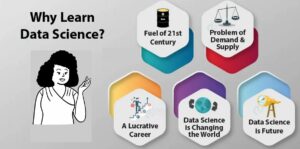What do most Uni students find themselves doing in their summer down time? Travelling, catching up with friends, festivals, and generally enjoying spontaneous adventure! For me, this summer was about adventure of a different nature and attempting to address that big question; what does life look like after graduation?! What better way to do that then to completely immerse myself in a professional environment in order to figure out what I enjoy doing – and just as importantly, what I don’t!
Why data and analytics?
I opted to take some data science modules as part of my Economics degree. They were aimed at Economics students with little prior knowledge of Python – which fit me perfectly considering my previous knowledge of Python consisted entirely of what I had learnt during workshops with the University of Essex’s robotics and mechatronics lab during a school trip when I was in Year 9.
A simple google search tells you all about the growing demand for data scientists and the skills they possess. This alone tells me all I need to know about the value of data literacy within the workplace both now and in the future. That, coupled with my own personal desire to learn, develop and increase my understanding of coding ultimately led to me pursuing a summer opportunity with the data and analytics team at ECC.

So, was the experience what I had expected?
Coming into this my understanding of data analytics was purely from my uni module which focused mainly on taking a dataset of some kind and creating interesting and informative visualisations from it. Naively, I had assumed that data analytics in a professional environment would be similar, however the differences became very apparent, very quickly!
My first surprise – the sheer breadth of a single data and analytics project. It involves more than just taking data and manipulating it, there is a huge amount of scoping, research, data exploration and presenting to be done alongside it, all things I would have never considered to be part of the role of a data analyst. Getting the opportunity to learn not only about how these elements contribute to a project from start to finish, but also the importance of how to visually present pieces of work, and how to communicate with colleagues to maximise the impact of the data project in the workplace, was very informative and were things that I had no prior experience or knowledge of.
As well as this, my impression of how a data analyst works within a team was very much in line with popular stereotypes: the idea that it is just you, alone in a dark room, coding in silence. Again, I quickly saw how inaccurate this was. Throughout my time, I was pleasantly surprised by the amount of collaboration that was involved in every single project to ensure that the work remains informative and on track and delivers value for the customer. Additionally, the open discussion that is encouraged in every meeting meant that questions I had regarding the projects I was working on could be answered by people who may be more familiar with the data I was working with or who may have experience in the topic. This entirely changed my perception of how a data analyst works and has emphasised how useful communication and collaboration is.
Feeding my curiosity
The variety of projects I was given ensured that I was never bored – for example, one of my projects required the use of RStudio, which I had never used before. Completing this project meant teaching myself how to use RStudio and I enjoyed the challenge of this. Surprisingly, to me, I was not the only one learning and developing my R language skills – there is a lot of code-sharing as well as people constantly teaching themselves and others around them new techniques or methods, and ensuring knowledge and practices are relevant, consistent and informed. For example, data ethics and how to implement it across the organisation was the focus of an in person monthly meeting that was attended by the whole team, giving me the opportunity to meet and interact with the team face-to-face.
I enjoyed the fast-paced, unique nature of the work. No two projects are striving to achieve the same outcome, making the work very engaging.
This completely contradicted my opinion of all ‘office jobs’ being a continuation of the same dull, mundane tasks every single day and proved that working in an office environment didn’t have to be boring and repetitive. The public sector being subject to constant changes means that project aims are always updating, as well as the software used developing, which requires the ability to adapt quickly. It is this element that made the work environment not only interesting but also exciting.
Having come to the end of my work experience, have I managed to answer that question of what it is that I want to do after Uni? No – But I can confidently say that it has proven to me that I have a real interest in data analytics, something that I am keen to explore even further in the future. Also, the data literacy skills I have developed alongside my new understanding of R are both things that I know will be useful to me in future whether that be personally or professionally. I feel that my experience with the team and what I have learnt in my time will benefit me regardless of whatever career I choose to pursue with the communication, engagement, teamwork and creativity that I have observed being relevant for any role in any sector.